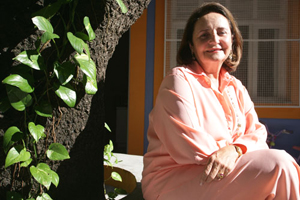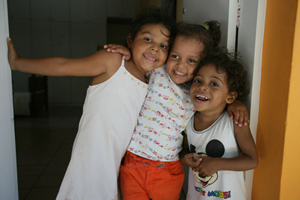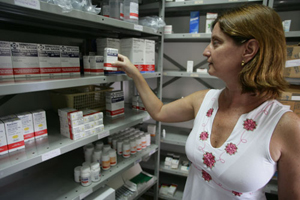“He is clapping from wherever he is,” Maria Lucia Araujo said emotionally of what her son, Cazuza’s reaction would be to the children’s home “Viva Cazuza” which was founded in his name.
Cazuza, one of Brazil's best-known solo artists, died in 1990 of an AIDS-related illness in Rio de Janeiro at the age of 32. Today, 65 children living with HIV are being supported by Sociedade Viva Cazuza, a non-profit organization dedicated to helping children living with HIV which is funded by royalties from his songs.
In February 1989, Cazuza became the first Brazilian celebrity to announce publicly that he was HIV positive. In the October after his death, Maria Lucia Araujo founded the home for children living with HIV.
Lucia Araujo didn’t know anything about HIV or AIDS when she learnt of her son’s diagnosis. “When he first told me that he was HIV positive I assumed that he would recover within the year,” she said. Her son’s death transformed her life. Married to a wealthy husband she had no need to work, but she had to do something. “I would have gone mad,” she said. “I couldn’t have slept if I hadn’t done anything.”
So she opened the home, the first of its kind in Rio. Since its opening, the organization has helped 67 children. As the availability of antiretroviral drugs has improved so has the children’s health. “The children go to local schools and have an active life just like any of the other children in the area,” said Lucia Araujo.
UNAIDS estimates that globally there are around 2.3 million children under 15 years old infected with HIV and according to a recent report by UNICEF, some 15.2 million children under the age of 18 have lost one or both parents to AIDS.
“There is a real need to support children living with HIV in Brazil,” said Dr. Laurent Zessler, UNAIDS Country Coordinator in Brazil. “We must make sure these children are not discriminated against. Children living with HIV are able to stay in school and live full and active lives, HIV shouldn’t be allowed to take away their childhoods,” he added.
“Since my son died the nature of the virus has changed a great deal; it is no longer a gay man’s disease, now more and more women are affected. They often have no idea that they are HIV positive and pass it to their children without knowing,” Maria Lucia said.
Children come to the house through many different avenues. One of the 24 children currently living in the house is 15-year-old Danielle who arrived 10 years ago with her sister after her mother died and her father was unable to cope. During her stay she has built up a good relationship with her father and hopes to live with him again someday.
Paraguayan Jose was found at the age of three abandoned and very sick in a hospital on the Paraguayan border. Now, nine-year-old Jose wants to be a film director.
The organisation also supports young adults who have left the home. Once a week, the home’s clinic is open for HIV positive adults to collect their antiretroviral drugs. As with all Brazilians who are HIV positive, antiretroviral treatment is provided free of charge by the government.
Besides material support, Sociedade Viva Cazuza also operates a Web site where people can ask experts about AIDS issues. The experts receive around 12,000 questions a month. Maria Lucia is shocked by the questions still being asked 20 years after AIDS first arrived in Brazil. “The most common questions are still – how do I contract the disease? How can I protect myself from contracting the disease?” she said. “It is not like Cancer where the experts still are not sure what causes it or how to prevent it – to prevent AIDS it’s simple – use a condom.”
Maria Lucia has become a prominent spokesperson on AIDS appearing regularly on television. She believes her son’s heritage is not only ‘his beautiful songs’ but also the home, by being open about HIV and appearing in public as the illness progressed. “He did a lot to educate people and help reduce discrimination against people living with HIV,” she said.
All photo credit: J. Spaul Links:
Sociedade Viva Cazuza Website
Cazuza's Website
Unite for children, unite against AIDS






